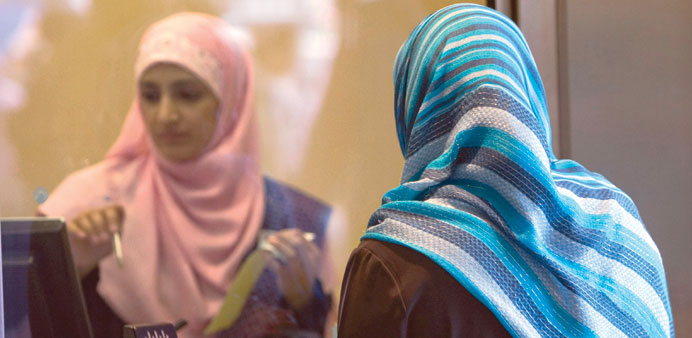A customer is served at the counter of a branch of the Islamic Bank of Britain, in Birmingham, UK (file). To ensure trading of the sukuk around the world, the IILM has signed agreements with eight primary dealer banks, said Ayhan Keser, executive vice president at Turkey’s Albaraka Turk, one of the market-making banks.
Based on different premise than other sukuk; participation of all primary banks not yet certain; crucial to achieve bid-ask spreads below 50 bps; some hoping for 25 bps; may also be used as collateral for money market operations
The International Islamic Liquidity Management Corp (IILM) faces a delicate task as it designs its maiden sukuk: it must make the issue attractive enough for investors to buy, but not so attractive that most of them buy to hold.
Whether it gets the balance right will affect the development of Islamic money market trading in the Gulf and Southeast Asia over the coming year.
The Malaysia-based IILM, backed by nine central banks and monetary agencies as well as the Jeddah-based Islamic Development Bank, has said it plans to issue up to $500mn of dollar-denominated sukuk in the second quarter of this year, and eventually expand the programme to as much as $3bn.
Its issues will be based on a very different premise than other sukuk. Other issuers design their sukuk merely to attract investors and raise money cheaply; the IILM’s mission is to create a highly liquid tool which Islamic banks will trade to manage their short-term funds.
To ensure trading of the sukuk around the world, the IILM has signed agreements with eight primary dealer banks, said Ayhan Keser, executive vice president at Turkey’s Albaraka Turk, one of the market-making banks.
“These primary dealers are given the right to purchase the issued sukuk in the primary market, have the responsibility to set the secondary market and actually buy and sell the bonds to form a market price,” Keser said.
Standard Chartered is another primary dealer, according to Standard & Poor’s. The bank declined to comment on its role.
The participation of other banks in the primary dealer network appears less certain, however. Qatar Islamic Bank, the Gulf state’s largest Shariah-compliant lender by assets, is still considering whether to take part, according to its chief executive.
“We will probably be. It’s still under discussion,” group chief executive Baseel Gamal said in Doha earlier this month.
Bank Islam, Malaysia’s largest standalone Islamic lender, is awaiting internal approval from its Shariah board, according to a source at the bank who declined to be named as he is not authorised to speak to the media.
A second Malaysian lender is also considering its participation, with the country’s central bank pushing for decisions to be made soon, the source said.
Luxembourg, where the sukuk will be domiciled, has one confirmed primary dealer while another is still working on the paperwork, according to a banking source familiar with the discussions, who declined to be named because of the sensitive nature of the issue.
No specific date has been given for the first or subsequent sukuk issues, and the IILM did not respond to Reuters questions.
Another key issue for the IILM sukuk, which are expected to have maturities of up to one year, will be their bid-ask spreads in the secondary market.
If the issues are too small relative to demand, many investors may end up buying and holding them rather than trading them, making price discovery difficult and resulting in wide bid-ask spreads that hurt their function as a store of value.
Other international sukuk often trade with bid-ask spreads ranging from 80-100 basis points, so the IILM paper will need to demonstrate it is much tighter than that.
Spreads above 50 bps could affect the IILM’s effectiveness and credibility, said the head of treasury at a Bahrain-based Islamic lender. “Below 50 is good - a quarter (0.25 percentage point) would be great.”
Jason Kabel, head of fixed income at Bank of London and the Middle East, said: “I would expect a bid-ask spread of roughly 25 bps, providing the issue is large enough to ensure sufficient liquidity.
“If the secondary market operates as expected it will show that this instrument is the ideal liquidity tool for many funds and companies.”
The IILM has gone to considerable lengths to win a high credit rating for its sukuk: A-1 from S&P. Its Luxembourg structure uses two entities, one holding long-term assets and the other issuing the short-term certificates. IILM documentation seen by Reuters shows the sukuk will be backed by sovereign assets from member countries, which some analysts believe could include aircraft and real estate.
The IILM statutes include a provision barring any creditor, investor or shareholder from seizing company assets or petitioning for bankruptcy proceedings. This clause is considered robust as it has been tested in the courts, said the Luxembourg-based banking source.
A high rating gives the sukuk preferential treatment under new Basel III international banking guidelines, and this could help Islamic banks boost their capital adequacy ratios.
“The IILM sukuk will also have a positive effect on balance sheet management for the banks. Since the said sukuk would be zero risk-weighted, the capital ratio of the bank would also be raised,” said Albaraka’s Keser.
Investment-grade sukuk from the IILM could also be used as collateral for interbank transactions and central bank financing, according to a study by Malaysia’s central bank.
The many potential uses of the sukuk underline the difficulty of the IILM’s task, however. If banks buy the sukuk to bolster their balance sheets or use as collateral, they may not trade the instruments - limiting their liquidity.

